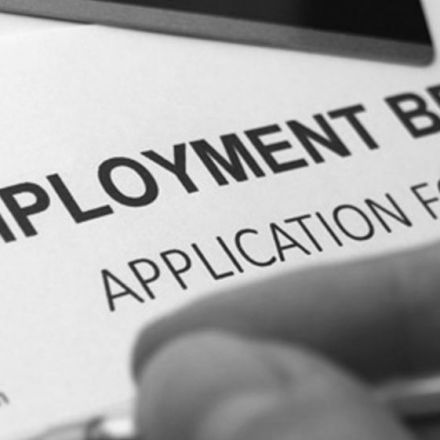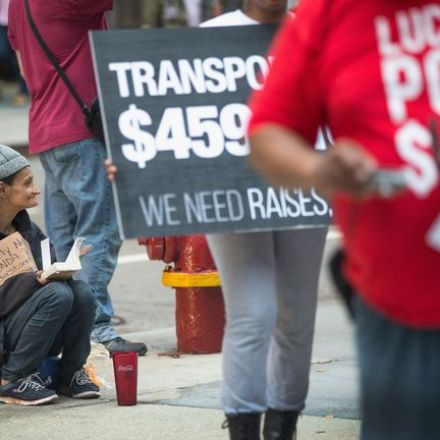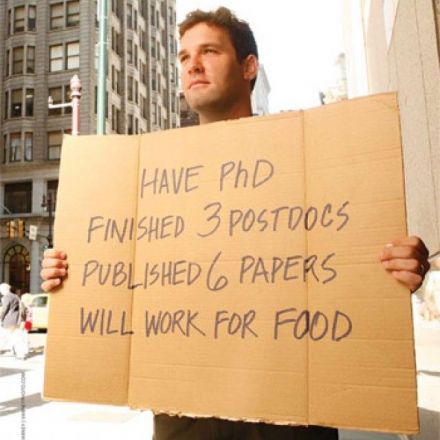

10 years ago
8
Why Wages Won't Rise
Jobs are coming back, but pay isn’t. The median wage is still below where it was before the Great Recession. Last month, average pay actually fell. What’s going on? It used to be that as unemployment...
Continue Reading


























Join the Discussion
I love Robert Reich. This man is an economic clairvoyant and an excellent teacher. Any cautionary message he puts out, I guarantee in 10, maybe 20 years we'll look back and think, "Yeah he was right."
There's a huge flaw in capitalism and we, as a united people, need to get mad.
I agree completely. I've said this for a long time in my personal life. Capitalism is a system of greed. For a long time, everyone being greedy at the same time was a balancing factor, because undercutting a competitor lead to profits. But even during that time, it was still a system of companies doing only what was most profitable with zero concern for their employees or the consumer. Frankly, that's not a business' job. It's job is to make money. That's is sole purpose. So anything that is more profitable will be done... screwing over whoever and whatever along the way. It's a terribly flawed system built on an unhealthy basis that would, at the very least, require a substantial amount of regulation to limit just how far they can screw people over for their own good.
This is me.
And this is every person I know outside of the internet.
Perhaps my perspective is skewed against capitalism because I haven't been on the good side of it.
The question is, how many people have been on the good side of it? And are their perspectives any less skewed?
I think if you look at it objectively and see that capitalism is hurting people, regardless of how many, you'd have to apply the subjective view that it's baaad. It's an evil system.
I'm personally appalled that I bought it for as long as I did. How was I supposed to know? I've grown up in a society completely accustomed to it and I've been raised by people who have been raised by people who found the system to be just fine. It's not. It just worked for a little while.
I feel I understand the problem now. Has anyone proposed a solution? I can't buy the reducing efficiency is the solution? Stop automation? Stop outsourcing? If workers are not moving to 'higher and better uses', how do we create those more meaningful jobs, and how do we nudge the 'shafted' workers towards those jobs?
Two solutions come to mind, but I hesitate to offer them as solutions because one is too horrible to be seriously considered, and the other too uncomfortable to consider... but the two most direct solutions are to either:
1. Reduce the number of people, and fairly rapidly. There are just far too many people in the system right now. Skilled, unskilled, in almost every field, in-country, international, too many college grads every year diluting the individual value of the degrees, too many job-seekers spamming up the hiring process, too many oldsters who can't afford to retire who are in turn blocking upward advancement of middle-agers, too many downwardly mobile middle-agers taking jobs that fresh college grads used to be able to reliably obtain, too many desperate college grads taking jobs that teenagers used to be able to reliably obtain, etc. As terrible as a repeat of the 1918 flu pandemic would be (fatalities adjusted to account for greater population in the present), the Black Death of the 14th century offers an example of the positive effect on the labor market that can come from a devastating plague. I don't know if anyone has done the calculation, but it would be... interesting to find out just how many people would need to die to make for a "healthy" 21st century economy according to the parameters our economy operates within.
2. Identify the technologies that weaken the labor market, and go to war with them. Ban them, put embargoes upon countries that haven't banned them, lengthy jail sentences for any and all who possess, use, or distribute such technologies (using the Drug War template, more or less), etc. Of course, this would mean the end of the internet, for starters. Historically, weakened labor has turned to a luddite POV (centuries ago in its namesake example, and more recently there have been minor stirrings in India along these lines), so I wouldn't be surprised to see this come up in the West sometime soon.
There is a sane path as well that offers a third option, exotic and unfamiliar as it may seem:
3. Not everywhere in the developed world is doing as badly as the US when it comes to wages and employment participation rates (IIRC Scandinavia is doing well), so some kind of reform program to adopt policies and standards from places that are doing better would be another way to go as well. (Now if only there was a Presidential candidate advocating doing exactly that...).
Of course, it is easier to destroy than to reform, built-upon, or create, so if/when a solution comes about (whether deliberately or more likely through inevitability, IMO a lot of #1 and a little of #2 will be how it goes. Hope it's #3 though.
Currently reading the book The Second Machine Age, which discusses this part from the article: "Not even professional work is safe. The combination of advanced sensors, voice recognition, artificial intelligence, big data, text-mining, and pattern-recognition algorithms is even generating smart robots capable of quickly learning human actions." There's a part in this book that discusses exactly that what is being discussed in this article. Still have to finish it, but it's a good read if you're interested in these kind of developments.
I think that part assumes that people are honest. If not human checks the books, then you could slip a malware on the accounting bot and have it slip a million dollars into a Swiss bank account. If no one looks regularly, you'll never know until you're out of money. Same with driverless delivery - just change the address and have the machine at the receiving site report that the delivery arrived. If no human is there, you're not gonna catch it. We already have skimmers on automatic payments collecting, we have identity theft, and people steal from self checkout all the time. Machines are great and efficient, but they're not smart enough to question orders. A human is.
"Wages won't rise" because of the decreasing labor force participation trend since 2009, coincidentally the inauguration of President Barack Obama.